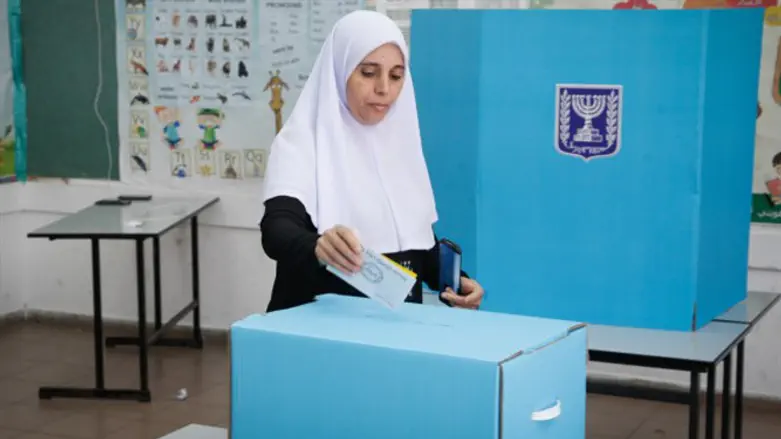
With the third Israeli parliamentary election on March 2nd rapidly approaching media reported that members of the Joint Arab list that won 12 mandates in the September election are reaching out to Jewish voters.
Firebrand politician Ahmed Tibi, for example, roams the streets in Jewish quarters of big cities and attends meetings with Jews where he, according to his own admission, is careful with his words.
Tibi, a former adviser to arch-terrorist Yasser Arafat, routinely condemns Israel for defending itself against terrorISM and refuses to condemn Palestinian Arabs who murder Israelis. instead he labels them nobly freedom fighters who die for their homeland.
Heba Yazbak, another Joint List politician, praises terrorists who killed Jews on his Facebook page such as Sami Kuntar who suffocated to death a two-year-old Israeli toddler and executed the father of the toddler in front of his four-year-old daughter before murdering the girl too by smashing her skull during the same terrorist attack in April 1979.
The Join List members of parliament have a habit of calling opponents ‘racists’ and of portraying the Arab minority in Israel as oppressed and neglected.
High unemployment among Arab Israelis is also the fault of the Jews in Israel and so are the gaps in income between the Jewish and the Arab sectors in Israel, according to the Arab MK’s
In the narrative of the Joint Arab list, Israel is also guilty of the rampant crimes and violence in Arab towns and villages while the Israeli police is accused of doing nothing against the indeed high number of violent crimes in these communities.
This claim runs counter to the data which indicate that Arab inmates make up 40 percent of prisoners in Israeli jails while they only make up a fifth of the Israeli population.
Tibi also criticized Prime Minister Binyamin Netanyahu for campaigning in Arab communities after the Israeli leader used the slogan ‘it’s either Bibi or Tibi’ in a reference to the possibility that the centrist Blue and White party could form a coalition with the Joint List which is a staunch anti-Zionist party.
Anyone who bothers to investigate the reality in the Arab towns and villages, especially in the Galilee where the bulk of the Arab Israelis are living, will see that the reality is much more different than the narrative of the Joint List.
Take, for example, the Arab town of Arraba which is located in the Galilee and has 26.000 residents of whom 400 are working as physicians the highest number per capita in the world.
"Something strange is happening in our town. In every home, you will find three or four physicians. I have several clinics all over the country. Who comes to my clinics? (People) from many cities and villages, Jews and Arabs alike," says Dr. Yussef Nasar a plastic surgeon from Arraba.
Saeed Yassin, a veteran family physician from Arraba, says all of his 10 sisters and brothers are now working as a physician while the same is true for three of Yassin’s children.
"Every six months, you hear the fireworks being launched to celebrate the graduation of another 15 or 20 physicians who passed the medical exams," according to Yassin.
Due to medical problems with several of my family members over the past year I was able to witness myself that Israeli Arabs are in large numbers working in hospitals such as the Baruch Padeh Medical Center in Poriah near Tiberias.
In the Poriah hospital roughly half of the staff is Arab including many physicians and nurses.
Even in hospitals that are located in regions with a small Arab majority such as Asuta Hospital in Ashdod, Arab nurses and doctors are making up a large percentage of the medical staff.
In pharmacies, one can see the same phenomenon. Many pharmacists are Arab Israelis and the same counts for universities in Israel where Israeli Arab students are well represented many of them women.
Dr. Wuroud Yassin, a physician now working in the Carmel Hospital, says she “studied at Technion ( a university in Haifa) together with people from various backgrounds and religions, including Arabs and Jews."
"I was the only girl in my family, and I was taught that there is no difference between a boy and a girl. I was also taught that nothing is impossible if you work hard,” she added.
An Arab girl from Kfar Kanna in northern Israel told me this week that she was happy with her life in Israel and said she wears jeans and other modern clothing because she feels very Israeli. She emphasized she is a 'liberal' Muslim.
An Arab entrepreneur from Wadi Hama in northern Israel, who wished to remain anonymous, says he has a large picture of the late Israeli Prime Minister Ariel Sharon behind his desk because he liked Sharon and because he did very good things for the country.
In this respect, also the current Israeli government led by Netanyahu is doing good things for the Israeli Arab community.
By the end of 2020 the Israeli government will have invested $4.3 billion in the Arab sector over the past four years while another $5.6 billion will be spent on developing the Arab high-tech sector which lags behind compared to its Israeli counterpart.